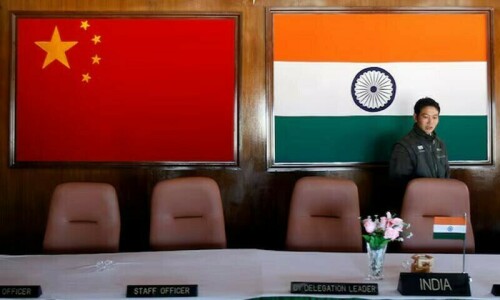A lesson to be learnt
BALOCHISTAN’S political dissatisfaction is mounting. No doubt the last eight years of defective re-engineering of the social, political and economic fabric of Baloch society has proved destructive.
But unfortunately the establishment in Islamabad is ignorant of this fact and continues to pursue the unchanged policy of denial and negligence towards Balochistan’s endless crisis.
The features of the confrontation between Islamabad and the Baloch are identical to the political conflicts witnessed elsewhere in the world. When oppressive and overcentralised state systems constantly strive to maintain their grip on powerless people by the use of brute force, the results are always the same.
Since 1947 Baloch demands have been clear. However, the recent military operation that led to the killing of senior Baloch leaders and caused much suffering and injustice has forced many to raise extreme demands.
The demands of Balochistan’s political parties in the 2004 dialogue were basically political. For instance, (a) governance of Balochistan should include the Baloch people’s right to self-rule, ownership of resources, political participation and control over the economy; and (b) security arrangements should include control over civil and armed forces and the police. But as confessed by Mushahid Hussain in his speech in June 2008, on my resignation from the Senate, “Hawks in the Pakistan Army scuttled Balochistan’s peace move.”
The Government of Pakistan and the provincial government of the NWFP have signed several peace deals with religious groups, but the political crisis in Balochistan has been totally ignored and no serious efforts have been made to end the conflict.
The powerless provincial government is willing to settle the issue but the security apparatus in the province is less enthusiastic to follow the peace path. The recent fighting in Dera Bugti is a clear indication that bloodletting will continue in the region until hostilities between Baloch fighters and security forces cease.
Pakistan is not the only multi-ethnic country which is experiencing political disorder and internal conflicts. Due to their political systems being overcentralised and inflexible, heterogeneous states have gone through extreme political turmoil. The majority have succeeded in dealing with crisis by restructuring their political systems and accommodating marginalised ethnic nationalities and regions in a fair and honourable manner.
Indonesia, the largest Muslim country in the world and by and large ruled by the military, has gone through political mayhem on a number of occasions. After the popular uprising of the East Timorese, futile military offensives and the 2004 devastating tsunami the Indonesian civil-military leaders were compelled to act politically and graciously to deal with the internal political crisis.
They agreed to resolve the long-standing military conflict with the Free Aceh Movement (GAM) through a political dialogue. Aceh is located in the north-west of Indonesia’s Sumatra island, surrounded by the Malacca Strait in the north and the Indian Ocean towards the south and west, which was badly hit by the tsunami.
In 1976, distressed political activists of the Free Aceh Movement took up arms against the Indonesian authorities. The violent reaction and resentment was the outcome of Jakarta’s neocolonial approach under which the people of Aceh were kept deprived of their natural resources and self-rule. Uneven distribution of resources, threats to their demography and planned militarisation further fuelled the anger and frustration.
In the 1990s, Jakarta launched massive military offensives to crush the insurgency in Aceh but failed. The 30-year conflict between Jakarta and Aceh rebels claimed 10,000 lives and caused displacement and human rights violations on a massive scale. Finally, the bloodletting came to an end after the parties demonstrated the political will and international mediation paved the way for peace.
In August 2005, the Indonesian government and GAM were brought on the peace track. Both parties confirmed their commitment to a peaceful, comprehensive and sustainable solution to the conflict in Aceh with dignity for all According to the deal GAM agreed to give up arms to foreign monitors, while Indonesia pledged to demilitarise the region while handing over security issues to the regional government. The Indonesian government agreed to cede power to the Aceh authorities in all public sectors, except in the fields of foreign affairs, external defence, national security, and monetary and fiscal matters.
Jakarta also agreed to withdraw its economic control and Aceh was allowed to raise funds from external donors, and was given the right to set interest rates, raise taxes to finance internal expenditures and conduct trade and business. A successful peace deal paved the way for billions of dollars and economic packages by the World Bank for the rehabilitation and reconstruction plan in Aceh.
The establishment in Islamabad needs to give the same attention to Balochistan’s politico-economic issues and to show similar will and courage. Administrative and economic control of the Gwadar port project turned into a major bone of contention between Islamabad and Baloch nationalists, while Jakarta agreed under the August 2005 agreement that the development and administrative and economic control of all seaports and airports within the territory of Aceh will be a provincial subject and Aceh will enjoy direct and unhindered access to foreign countries by sea and air.
For sustainable peace and to win the minds and hearts of the people of Aceh, the Indonesian government agreed to establish a human rights court and a Truth and Reconciliation Commission with the task of formulating and determining reconciliation measures.
Both parties agreed to the establishment of the Aceh Monitoring Mission (AMM) with the support of EU and Asean countries to monitor the implementation of the commitments agreed to and signed by both the parties.
Confrontation between the centre and the provinces in Pakistan is on the rise. Islamabad has lost its credibility and has failed to retain its control over the provinces and their people because of its resort to the use of brute force.
The people of Balochistan have been persecuted repeatedly for their demand that they be given control over their natural wealth. Indonesia agreed that Aceh will have jurisdiction over its living natural resources in the territorial sea surrounding Aceh, and the region was entitled to retain 70 per cent of the revenues from all current and future hydrocarbon deposits and other natural resources in the territory, as well as in the territorial sea surrounding Aceh.
Political stability, peace and economic development will remain a pipe dream if the rulers continue to ignore Balochistan’s political crisis. Countries have achieved their goals through learning from successful experiences. The Indonesian lesson and peace strategy may provide guidelines for a sustainable solution to the Baloch-Islamabad conflict.
Resolving Balochistan’s conflict through political means and accepting the Baloch as genuine owners of their wealth and destiny is the only way out of this quagmire. Peace in the province will pave the way for long-lasting peace and economic development in the region.
The writer is a former member of the Senate.
balochbnp@gmail.com
Foreign exchange crisis
THE new government has inherited a challenging balance of payments situation, with the current account balance deteriorating precariously over the last six months.
Of additional concern is the decline in foreign exchange reserves from $15.7bn in July 2007 to $10.7bn in July 2008 and the rapid 18 per cent depreciation in the value of the rupee.
The prime reason for the increase in the current account deficit is the massive growth in the trade deficit, which stood at nearly $20.8bn in 2007-08 (with imports of roughly $40bn and exports of $19.2bn) compared to $13.5bn in 2006-07 (a 53 per cent increase). The widening of the deficit is a result of the 31 per cent growth in imports that surpassed the 13 per cent growth in exports by nearly two and half times.
Given that Pakistan also imports shipment and insurance services, the rise in imports of goods led to higher payments for such services. Resultantly, the services and income deficit also increased from about $8bn in 2006-07 to $10bn in 2007-08, a 28 per cent rise.
The root of the problem lay in import growth, led by the growth in import of petroleum products (55 per cent), wheat (1,900 per cent), raw cotton (100 per cent), fertiliser (98 per cent) and edible oils (76 per cent). These items accounted for well over one-third of the import bill in 2007-08. However, petroleum imports (28 per cent of the total import bill) accounted for 43 per cent of the increase in imports.
In absolute terms, of the $9.4bn increase in the import bill in 2007-08, almost $6.6bn was on account of just five items: petroleum products ($4bn), wheat ($818m), edible oils ($762m), raw cotton ($645m) and fertilisers ($440m).
On the export front, textile manufactures have traditionally accounted for about two-thirds of export receipts and remain the mainstay of foreign exchange earnings. But in 2007-08, exports of major textile items declined, in value as well as quantity. Altogether, the value of exports of textile manufactures declined by 2.3 per cent in 2007-08. However, exports of other items showed some improvement.
In absolute terms, of the $2.3bn increase in export earnings in 2007-08, $692m came from rice, $344m from petroleum products and $1bn on account of exports of other goods including cement, chemicals and pharmaceutical products, surgical and medical instruments, leather manufactures, gems and jewellery, and electric fans and other electrical machinery.
As against the 53 per cent growth in the trade deficit and the 28 per cent growth in the services deficit, inflows through net private transfers increased by only 13.6 per cent. Consequently, the current account registered a deficit of $14bn in 2007-08 compared to $7.4bn in 2006-07, an increase of over 90 per cent. And as a per cent of GDP it increased from five per cent in 2006-07 to eight per cent in 2007-08.
The trade and services deficit is financed by net receipts from the transfer payments account, of which more than half is comprised by workers’ remittances. On account of low current account deficits, transfer payments amounted to 146 per cent and 223 per cent of the deficits in 2001-02 and 2002-03 respectively and added substantially to reserves. However, with the increase in the trade and services deficit in 2007-08, receipts from transfer payments now finance only 45 per cent of the deficit.
The remaining part of the current account deficit is financed through capital inflows — largely comprising foreign investment and privatisation proceeds. For the year 2006-07, capital inflows financed almost 50 per cent of the deficit but this figure declined to 34 per cent in 2007-08. Partly this was also due to the absolute decline in FDI and portfolio investment from $8.4bn in 2006-07 to $4bn in 2007-08.
Given this scenario, $6bn have had to be drawn from the reserves, which declined from a peak of over $16bn in November 2007 to less than $11bn in June 2008. Alarmingly, the current level of reserves is sufficient to finance only three months of imports and any further increase in the current account deficit will create an emergency situation.
Certain policy measures have been taken in the 2008-09 budget to suppress the growth in imports. These include levying higher import duty on about 300 non-essential luxury and consumer durables; increasing customs duty on luxury vehicles of 1800cc and on used motorcars and jeeps below 1800cc; and imposing a customs duty of Rs500 on the import of cellular phones. However, the total value of such imports altogether amount to no more than $3.5bn, or less than 10 per cent of total imports. Resultantly, any meaningful reduction in imports of such items seems unlikely through tariff measures.
Pakistan is an import-based export economy and cannot afford to curtail much of its imports that largely consist of petroleum products (28 per cent), industrial machinery (10 per cent) and raw materials (16 per cent). These imports have inelastic demand and import compression measures are likely to adversely affect the cost of production and exports. In addition, Pakistan’s continuing dependence on the import of food items like edible oils, wheat, tea and pulses (altogether 7.5 per cent of total imports) further enhances its import bill.
The problem is structural and there is an urgent need to formulate and implement a strategic policy to finance the rising trade and services deficit in order to avoid depletion of foreign exchange reserves. The policy needs to focus primarily on raising exports, wherein the problem areas are the growing cost of production, insufficient infrastructure, declining productivity growth, product and spatial concentration in exports, etc. That foreign direct investment has not been forthcoming in the manufacturing or export sectors is not surprising.
In respect of export promotion too the measures appear to be directionless. The government has allocated Rs1bn for the establishment of export processing zones (EPZs) in parts of Balochistan and the NWFP. It is to be noted that if the government has not had much success with an EPZ in a metropolitan port city like Karachi (e.g. Textile City), establishing these zones in Balochistan and the NWFP seems to be a mere political sop.
Shin Bet’s coercion
SERIOUSLY ILL Palestinian patients are being pressured to collaborate with Israeli intelligence by informing on militant and other activities in return for being allowed out of Gaza for medical treatment.
Israelis domestic intelligence agency, Shin Bet, is playing an increasingly important role in determining whether patients should be allowed to keep hospital appointments in Israel or the West Bank, a new report by Physicians for Human Rights Israel [PHR] claims.
PHR has collected testimony from more than 30 patients with serious illnesses, including cancer, who describe being pressured by interrogators at the main Erez terminal between Israel and Gaza. They include a 38-year-old man due for treatment at Tel Avivis Ichilov hospital who says he was told: ‘you have cancer, and it will spread to your brain. As long as you don’t help us, wait for Rafah crossing [the rarely open exit to Egypt].’
The report, which charges Shin Bet with ‘coercion’ and ‘extortion’ of patients, says this comes against a background of a sharp rise in the proportion of patients being denied permission to enter Israel for medical treatment since Hamas’s takeover of Gaza, in June 2007.
The rise in refusals from 10 per cent in the first half of 2007 to 35 per cent in the first half of 2008 coincided with what PHR says is increasing restrictions in the supply of medical spare parts, fuel and electricity as part of an Israeli blockade of all but essential humanitarian supplies. This in turn has increased the number of referrals for treatment of patients outside Gaza.
The report says that, according to Shin Bet, the goal of the interrogations is ‘to estimate the degree of danger posed by the applicant’. It adds: ‘In practice [the agency] collects intelligence on what it defines as security issues.’
Most of those who have testified declined to give their names for fear that it could jeopardise any further chance of leaving Gaza for treatment. But one who has, journalist Bassam Al Wahidi, 28, said he was interrogated in late August 2007 during over six hours of detention at Erez, missing his appointment at St Johnis Hospital in East Jerusalem to save the sight in his right eye from retina damage.
He said that after arriving on the Israeli side, he was led to an interrogation room where a man speaking perfect Arabic introduced himself as Moshe. Moshe told him: ‘I want you to do me a favour. I will talk to the big leaders in the Israel Defence Forces and say he’s a good guy. We have to help him.’
He said that Moshe asked him to use his job as a journalist to go to border areas and see who was launching rockets and where, and to attend press conferences of factional military wings. He would be given an Israeli mobile chip and asked to call a number with information. If he proved himself over 10 days, he would be allowed to go through Erez ‘with no permit’ and be allowed through for treatment at the Ichilov hospital in Tel Aviv. Moshe also hinted he would get financial and other help.
Mr Al Wahidi — who had previously been given an exit permit — says he made clear that he would not co-operate, and that he would go to human rights organisations, the Red Cross and the press. He claims that Moshe, who had earlier said he was losing his patience, laughed and added: ‘What you are talking about does not exist in the dictionary of the IDF.’ Mr Al Wahidi says that when he invited Moshe to arrest him or allow him out for medical treatment, he replied: ‘I will send you back to Gaza and let you live the rest of your life blind because you are stupid.’
Mr Al Wahidi was indeed sent back to Gaza and has not been allowed out for treatment since. He says he has now lost the sight in his right eye and needs urgent treatment to save his left eye, and that doctors told him a month ago to stop reading or writing to ease the pressure on his left eye.
In a response to the report, the military branch responsible for Co-ordination of Activities in the Territories says that there has been a sharp increase in attacks on and attempts to infiltrate through the Erez crossing by Palestinian militants. It says that the number of those exiting the Strip for medical treatment rose from 8,325 to 15,148 in 2007. It says that the Supreme Court has ruled that ‘it is the state’s sovereign right to determine who enters its gates and that the extent of discretion granted to the authorities is ... very broad.’
— © The Independent











































Dear visitor, the comments section is undergoing an overhaul and will return soon.